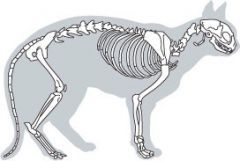Grade Level(s):
- 3-5
- 6-8
- 9-12
Source:
- UC Museum of Paleontology
Resource type:
- classroom activity
Discipline:
- Life Science
Time: One class period
Overview
In this lesson, students play the roles of paleontologists on a dig. They "unearth" a few fossils at a time and attempt to reconstruct the animal the fossils represent.

- [What is science?: Grades 3-5] Scientists ask and address questions. (P1, P3, NOS4)
- [What is science?: Grades 3-5] Scientists base their ideas on evidence from the natural world. (P3)
- [What is science?: Grades 3-5] Scientific ideas may change with new evidence. (NOS3)
- [What is science?: Grades 6-8] Science deals with the natural world and natural explanations.
- [What is science?: Grades 6-8] Scientists strive to test their ideas with evidence from the natural world; a hallmark of science is exposing ideas to testing. (P3, P4, P6, P7, NOS2)
- [What is science?: Grades 6-8] Scientific knowledge is open to question and revision as new ideas surface and new evidence is discovered. (P6, NOS3)
- [What is science?: Grades 6-8] Scientific ideas cannot be absolutely proven.
- [What is science?: Grades 9-12] Science focuses on natural phenomena and processes.
- [What is science?: Grades 9-12] Scientists strive to test their ideas with evidence from the natural world; a hallmark of science is exposing ideas to testing. (P3, P4, P6, P7, NOS2)
- [What is science?: Grades 9-12] Scientific knowledge is open to question and revision as new ideas surface and new evidence is discovered. (P4, P6, NOS3)
- [What is science?: Grades 9-12] Scientific ideas cannot be absolutely proven.
- [How science works: Grades 3-5] Scientists observe, explore, discover, and communicate with one another.
- [How science works: Grades 3-5] Scientists don't always agree with one another. (P7)
- [How science works: Grades 6-8] The process of science involves observation, exploration, testing, communication, and application.
- [How science works: Grades 6-8] The real process of science is complex, iterative, and can take many different paths.
- [How science works: Grades 6-8] Scientists test their ideas by predicting what they would expect to observe if their idea were true and then seeing if that prediction is correct. (P4, P6)
- [How science works: Grades 6-8] Scientists can test ideas about events and processes long past, very distant, and not directly observable.
- [How science works: Grades 6-8] Different scientists may interpret the same data in different ways. (P7)
- [How science works: Grades 9-12] The real process of science is complex, iterative, and can take many different paths.
- [How science works: Grades 9-12] The process of science involves observation, exploration, testing, communication, and application.
- [How science works: Grades 9-12] Scientists test their ideas (hypotheses and theories) by figuring out what expectations are generated by an idea and making observations to find out whether those expectations are borne out. (P4, P6)
- [How science works: Grades 9-12] Scientists can test ideas about events and processes long past, very distant, and not directly observable.
- [How science works: Grades 9-12] Different scientists may interpret the same data in different ways. (P7)
- [Hypotheses and theories: Grades 6-8] Hypotheses are potential explanations for what we observe in the natural world. (P6)
- [Hypotheses and theories: Grades 6-8] Hypotheses are usually inspired and informed by previous research and/or observations. They are not guesses. (P6)
- [Hypotheses and theories: Grades 9-12] Hypotheses are proposed explanations for a narrow set of phenomena. (P6)
- [Hypotheses and theories: Grades 9-12] Hypotheses are usually inspired and informed by previous research and/or observations. They are not guesses. (P6)
- [The social side of science: Grades 3-5] Scientists explain their ideas and evidence to one another. (P7, P8)
- [The social side of science: Grades 3-5] Scientists work together.
- [The social side of science: Grades 6-8] Scientists check each other's work, often through peer review. (P7)
- [The social side of science: Grades 9-12] Scientists usually work collaboratively. (NOS7)
- [The social side of science: Grades 9-12] Science relies on the accumulated knowledge of the scientific community to move forward. (NOS5)
- NOS Matrix understanding category 2. Scientific knowledge is based on empirical evidence.
- NOS Matrix understanding category 3. Scientific knowledge is open to revision in light of new evidence.
- Science and Engineering Practice 4. Analyzing and interpreting data
- Science and Engineering Practice 6. Constructing explanations and designing solutions
- Science and Engineering Practice 7. Engaging in argument from evidence
There are currently no teaching tips for this resource.
